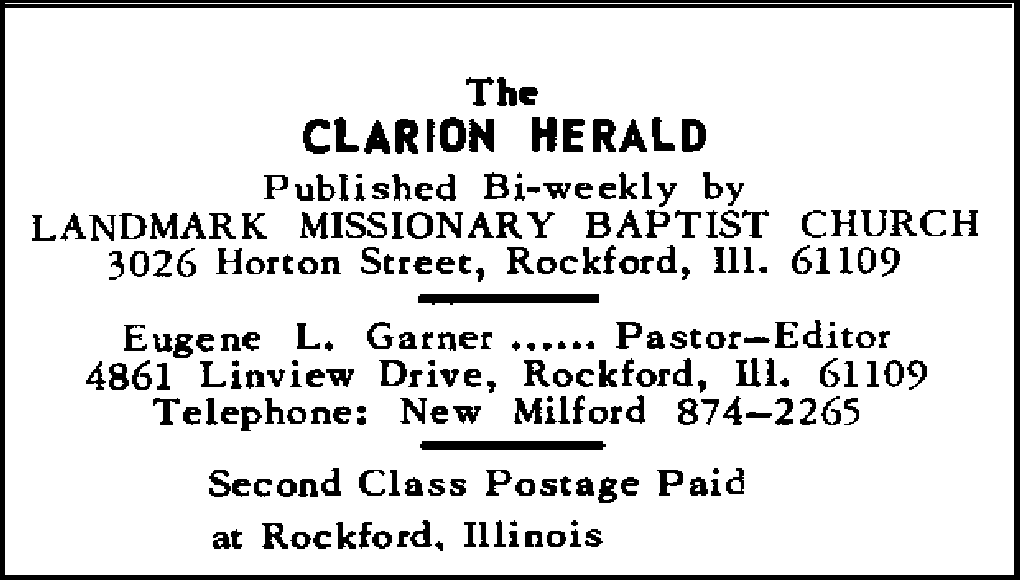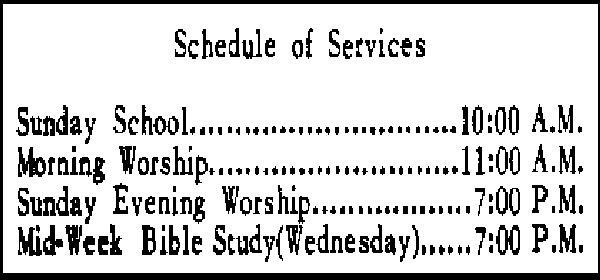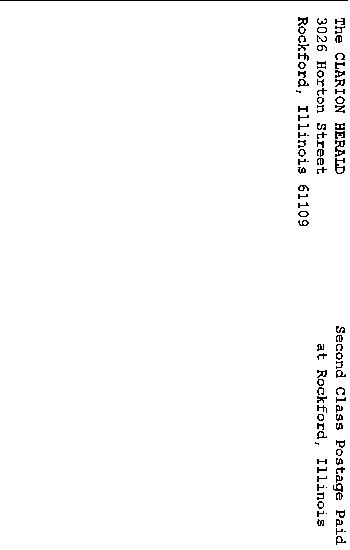
|
 |
 |
 |
|
 
|
|
|
THE PARABIE OF THE FIG TREE
Correcting a common misconcep - tion among the Jews - that every tragedy proved the victims guilty of some great sin - Jesus said, in effect: "No! Unless YOU repent, YOU will all likewise perish!" Then He spoke the parable of the "fig tree" - showing the infinite mercy and patience of God without which they would have already perished.
The fig tree symbolized the covenant nation, from which He had every right to expect good fruit. But He found none. Divine justice cried: "Cut it down; why cumbereth it the ground?" But divine mercy pleaded: "Lord, let it alone until I cultivate and fertilize it; And if it bear fruit, well: and if not, then thou shalt cut it down".
God's Word had been despised; His messengers ill--treated, rejected and slain; His son about to be crucified. It is Jesus Himself Who pleads that the sword of justice be withheld a little longer. He cared. He wept. But, the nation failing to respond, it was cut down AD 70.
In the same way, God is bringing ALL OF US into judgment. We must be honest with ourselves and with God. Turning from our sins, let us trust Him wholly. E. G.
|
|
|
|
RESTING IN THE PROMISE
OF REDEMPTION
(A Study in Ruth 3)
There is a sense in which this may be regarded as the "crisis--chapter" of Ruth. Following the death of her Jewish husband, Ruth has come with Naomi, her mother-in-law, to Bethlehem -- from whence a once-happy family had migrated in an effort to escape the famine that God had sent upon the land of Judah. Ruth had deliberately turned her back on her family and homeland because of her deep love for Naomi and Naomi's God. She has come to find shelter under the wings of Israel's God, whom she deliberately chose as HER GOD.
Volunteering to seek sustenance for herself and Naomi, by gleaning, she has come to the field of Boaz--an honorable kinsman of Elimelech, her deceased father-in-law. In him she has found kindness, comfort and favor. At his invitation she has gleaned in his field, among his maidens, through both the barley and wheat harvests. And during this time she has been permitted to eat at his table during the day.
Now the harvest is ended. The daily meetings between Ruth and Boaz have ceased. Naomi, probably
|
|
|
|
|
Page - 2
discerning the deep loneliness that has crept over her, is vitally concerned for her happiness. To look upon Naomi as a "scheming old lady" is probably to judge her far to harshly. In self-forgetful love, Ruth has forsaken all else to be faithful to her mother-in-law. And Naomi, in her self-forgetful concern for Ruth's happiness, proves herself worthy of the bond that has held them together. Her actions will be in perfect harmony with the customs and laws of the Jews.
Deep within her heart Naomi purposes to seek "rest" for Ruth. Nor is it mere cessation from labor that she seeks; she desires for Ruth a "menuchah" -- a safe shelter in a husband's house. The deep sadness of Jephtah's daughter was that she should never know such a "rest" in the house of a husband -- being devoted (by her father's decree) to perpetual virginity. Because of her fear that she would not find such a "rest" in Israel,
|
|
|
|
Orpah had turned back to Moab. So, Naomi is deeply conscious of the destitution and constant peril the young widow will face if left alone by the death of the one to whom she has been so faithful.
Conscious of the interest and kindness Boaz has manifested toward Ruth, Naomi is emboldened to test his willingness to assume the responsibility of "goel" in their behalf.
Three basic responsibilities rest upon a "god", or kinsman-redeemer. Where poverty has compelled a brother to go into slavery, or to dispose of his land, the kinsman must, according to his ability, redeem his brother and his brother's inheritance, (Lev. 25:25-28; 47-55). He must be the avenger of his brother in case of fatal violence against him, (Num. 35:15-34). And, if his brother has died, without leaving a son, he must marry the widow and raise up a successor to his brother, (Deut. 25:5-10).
It is time for the winnowing of barley at the threshing-floor-which was always a festive occasion. Naomi's plan could prove hazardous, but her confidence in both Ruth and Boaz embolden her to run the risk. First, Ruth must cleanse and anoint herself; then, laying aside the garments of her widowhood and mourning, she must attire herself in festive garb and go to the threshing floor. She must prepare herself for the presence of him in whom her soul delights. Such preparation is essential for the church as she comes into the presence of her Lord (Eph. 5:25-26; Psalm 45:10-17; Rev. 19:7-8).
|
|
|
|
|
It is a tender and delicate scene that we are here permitted to view, by moonlight, at the threshing floor (Ruth 3:6-12). Ruth faithfully obeys all that Naomi commands; She goes to the threshing floor, but carefully conceals her identity -- fading into the shadows until Boaz sleeps. Then she creeps silently, timidly, carefully and fearfully to the place where he lies. Gently uncovering his feet, she lies down -- just as Naomi has commanded.
At midnight the presence of Ruth is discovered. A man of honor, Boaz is startled to discover a woman lying at his feet, and demands: "Who art thou?" Fearfully and humbly, the Moabitess maiden answers according to the instruction of Naomi. "I am Ruth, thine handmaid." Then she states her purpose in coming: "Spread therefore thy skirt over thine handmaid; for thou art a near kinsman". Boaz immediately recognizes this as the plea of widowhood -- for protection. She, in this way, vindicates her action; IF HE WILL, he is one who has a right to redeem her.
The gracious response of Boaz is a tribute to Ruth's virtue and reveals the true nobility of his own sterling character. He blesses her (vs. 10). He commends her fidelity -- both to her deceased husband and to her mother-in-law. But her kindness, rather than run after some handsome YOUNG man, was a gesture that he could not take lightly. He comforts her -- setting her heart at ease: "Fear not, my daughter". Only thoughts of goodness and purity pass between them. Her humility is commendable; his honesty
|
|
|
|
praiseworthy.
Boaz also praises Ruth. Her virtue is recognized from the least to the greatest among his people -- even by those in authority. (In like manner, men will recognize the rich qualities of a church that is patterned on New Testament principles and functioning according to the spirit of Christ.)
Admitting his kinship, Boaz explains why he has not already taken the initiative in proposing marriage to Ruth. He is aware of a considerable difference in their ages. And there is a nearer kinsman whose "right" it is to redeem them, if he so desires. And, he may have felt that Naomi herself, the widow of Elimelech, had a prior claim on him. But, in her sending Ruth, Naomi has waived her own claim in favor of her beloved daughter-in-law. Elimelech's inheritance may be preserved through the seed of Mahlon.
Thus, Boaz gives to Ruth a promise and pledge of redemption, (vs. 13-18). He cannot promise to redeem her personally until he has consulted the closer kinsman; so she must wait until morning. But, concerned for her welfare and honor he bade her abide for the night at the threshingfloor; but she must leave before daylight. If she were discovered there someone would be certain to question the morals of both. But it would be unsafe for her to leave alone at this late hour. With the approach of daylight she might more safely depart to her mother-in-law.
Nor is Boaz willing to send Ruth back empty-handed. The six measures of barley was but a pledge of
|
|
|
|
|
the fulness they are to enjoy. This gesture was a pledge that Ruth's desire (and Naomi's) was understood; Boaz could be trusted to do all within his power to fulfil it. (So, in our identity with Christ, as members of His body, we have been given an "earnest of the Spirit" with our ultimate redemption in view. See: Eph. l:ll-l4; I Cor. 2:9-10; 1 Pet. l:3-5).
Understanding the symbolic gesture of Boaz, the heart of Naomi overflowed with joy and gratitude. She cautions Ruth to "sit still". The matter must now be settled between the Lord, Boaz, and the nearer kinsman. And Naomi is fully confident that the honorable Boaz will not "rest" until he has brought the matter to a conclusion this very day.
|
|
|
|
How marvelously Jesus Christ has undertaken for those whose trust is in Him! When our lives are fully committed into His hands there is no need to fret and worry; we may be still and confident. For the sake of His people He will not hold His peace, and He will not rest, until the marriage-feast is ended. Having accepted the responsibility for our redemption, He will accomplish it completely. So, when we have truly committed our hearts and lives to His direction, we may enter into the joy of perfect rest and peace. With Paul, we will then be enabled to say: "I KNOW whom I have believed, and am persuaded that He is able to keep that which I have committed unto Him against that day", (2 Tim. 1:12).
ALL SET FOR FELLOWSHIP '76!
It is now only four weeks until time for our Annual Thanksgiving Fellowship Meeting here in Rockford. To have brethren come from far and near to share these days of blessing is a real joy to our hearts.
This year we anticipate a good attendance and such a time of sharing together in the Word of truth as will both warm our hearts and be a challenge to more faithful service. We joyfully anticipate having a number of young preachers in attendance. And we expect many other Christian young people -- who are always an encouragement.
Pray with us that the Lord will use this meeting to the glory of His name, the strengthening of our various churches & the salvation of souls. See you on November 25-26!
|
|
|
|
|
 |
 |
 |
|




